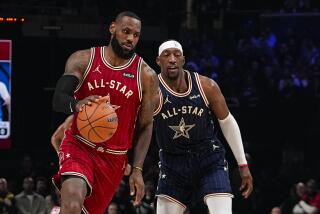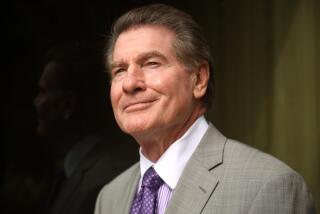Game on: Pros and big-league politics
Howard Cosell called it “rule No. 1 of the Jockocracy”: the idea that sports and politics must never mix. This last election season though, that iron wall separating the two worlds wasn’t merely breached, it was flattened.
It has been little reported and even less discussed, but the very same energy that coursed through the body politic for “hope” and “change” made its way into that at-times-explicitly-apolitical space, the pro sports locker room. In the National Basketball Assn., for example, superstar LeBron James held fundraisers and wore Obama T-shirts to the arena. Kevin Garnett of the Boston Celtics wrote slogans like “Vote for Change” on his high tops. Even Carmelo Anthony, who several months back said he wouldn’t endorse Barack Obama because Democrats and Republicans “both buy my shoes,” pledged to strive to score 44 points the night after the election in honor of Obama, the 44th president. (He only scored 28, which I suppose was a tribute to Woodrow Wilson.)
In baseball, World Series champion Philadelphia Phillies captain Jimmy Rollins did a rally with Joe Biden. In football, Denver Broncos wide receiver Brandon Marshall talked after scoring a game-winning touchdown about how Obama “inspires me, our multicultured society.” Scott Fujita, linebacker for the New Orleans Saints, even told me that there are football players in the locker room arguing with other players that their taxes should be raised to help get the country out of debt and despair. That is unheard of. Similar arguments about money and greed were raised by NBA players Al Harrington and Tyson Chandler.
It’s worth noting that Obama didn’t get all the sporting energy. Retired NFL Hall of Fame quarterbacks John Elway, Roger Staubach and Troy Aikman all rallied for John McCain. Note what they all have in common: The older and lighter complected on the athletic scale, the more support leaned toward McCain. In other words, the sports world was not all that different from the real world. Also, pro sports owners filled McCain’s coffers with contributions by a 6-1 margin.
One would have to, as Marshall noted, go back four decades to see such a display of the sporting and the political. All that time, the guiding political ethos of the professional athlete could be best summed up by Michael Jordan’s statement that he wouldn’t stand up against North Carolina’s arch-right-wing Sen. Jesse Helms because “Republicans buy shoes too.”
Now, we may have seen the end of that era. The new era might be best summed up by Baron Davis, who, when told that his support of Obama might cost him endorsement possibilities, responded, “Like I give a ... .”
It also is a reminder that athletes don’t live on “planet jock,” coming down to Earth to entertain us at game time. They are part of the world as well and have their own stake in seeing a measure of change. The truly fascinating story to come will be seeing what happens to all of this energy once the inauguration speeches are done and the smoke has cleared.
There of course is a tradition of the political athlete, from Muhammad Ali to Billie Jean King, but it’s a tradition that in recent years seemed a relic of a musty past. The idea of athletes, with their short playing careers, risking the wealth and attendant privileges of stardom seemed ludicrous.
But today it has been revived, in no small part because of two factors: first, the excitement and multicultural pride surrounding Obama’s run. No question, basketball and football -- disproportionately populated by people of color -- have been sites of serious inspiration. And there is also the stubborn fact that although athletes may make terrific money, they tend to come from families living in hard times.
Chandler, once a star at Compton’s Dominguez High School, reflected this tension in his endorsement: “I’m obviously the only one in my family that can say that I’m a millionaire. I’ve seen my entire family struggle. So, would I rather see my whole family struggle while I get a break, or have me not get a break while the rest of my family gets one? I’ll take my entire family getting a break.”
Will athletes maintain their political engagement, or will it quickly go back to business as usual? One thing is certain: The sports page just got a lot more interesting.
Dave Zirin is the author of “A People’s History of Sports in the United States.”
More to Read
A cure for the common opinion
Get thought-provoking perspectives with our weekly newsletter.
You may occasionally receive promotional content from the Los Angeles Times.






